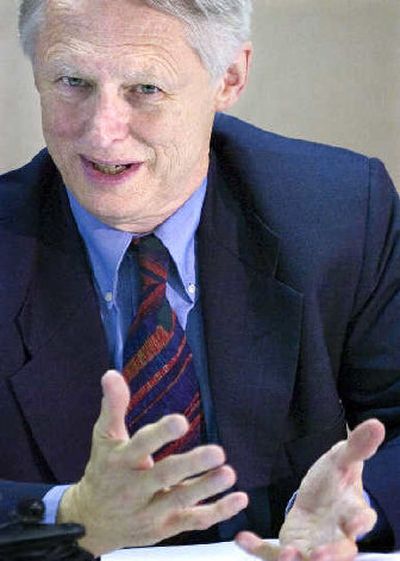Some fund-raisers get rich on charity

OLYMPIA – The phone rings, or the mail arrives, and it’s someone hitting you up for a charitable donation. Please give, you’re asked. The children – or the sick, elderly, hungry, widows, veterans, homeless or the environment – need you.
But how much of your dollar actually goes to those causes? How much pays the person hitting you up for cash?
The answer varies greatly, according to a report released Tuesday by Secretary of State Sam Reed. Although some commercial fund-raisers last year kept as little as 7 cents of every donated dollar, many others kept 85 cents or more.
A Phoenix-based company called Nationwide Fundraisers Inc. solicited more than $61,088 last year from Washingtonians for police groups, veterans and a needy children’s ministry. The groups got a total of $6,103 – less than a dime out of every donated dollar.
California-based Gordon and Schwenkmeyer Inc., gathered nearly $348,000 here for an abortion-rights group, farmworkers and the homeless. Of that, the groups got $7,700, or about 3 percent.
Interestingly, this year’s annual report also suggests that the number of paid fund-raisers – and how much they’re collecting – is skyrocketing. Over the past decade, donations collected by paid fund-raisers here have risen five-fold, from $86 million to $444 million. The number of companies soliciting here has risen from 87 to 114.
“The lesson here is that while people in the state of Washington are generous, and ought to be, they need to be more vigilant,” Reed said in an interview. “When the companies are keeping most of their money for themselves or using the money for expenses, they need to know that.”
The most efficient paid fund-raiser in Tuesday’s report is Bellevue-based Coinstar, Inc., which places coin-sorting machines in supermarkets and stores. Anyone with extra coins can dump them into the machines and either get dollars or donate the money to area charities. Of nearly $260,000 donated in Washington last year, the company kept just 7 percent. Recipients included the Red Cross, Make-A-Wish Foundation, World Wildlife Fund, March of Dimes and the Salvation Army.
Also in this year’s top 10 were two local fund-raisers. Spokane’s NFB Associates, Inc. raised $348,000 for the state’s National Federal of the Blind, with 75 percent of each dollar going to the group. A much smaller Spokane operation called Peachtree Fundraising LLC also returned 75 percent. Peachtree raised $1,511 for Central Valley High School.
The Spokesman-Review, through its Christmas Fund, solicits donations every year for the Christmas Bureau, which is run by local charities. The newspaper, which is not covered in Tuesday’s report because it’s not a commercial fund-raiser, keeps none of the money it raises for the bureau.
In Reed’s view, at least 65 percent of every donated dollar ought to go to the charity. And charities, he said, need to do a much better job of selecting who collects in their name.
Sometimes he gets calls from charities unhappy with the annual report.
“They’ve been embarrassed by some of these numbers that come out,” Reed said. “They say ‘Gee, it’s not our fault.’ Well, it is.”
Typically, he said, the charities argue that it’s free money. They don’t have to call anyone, send out any mailings, or ask for volunteers to seek donations. But donors, Reed said, still expect the maximum amount of their dollar to actually go to the charity.
Some fund-raisers argue that the report is unfair. Edward Mock, with Unique Equity Inc., based in Kent, runs a thrift store for a cerebral palsy group. It’s listed as returning just 12 percent of $615,000 collected last year. But Mock said the report doesn’t mention that he had to spend $543,000 on payroll, trucks, repairs and mailers to collect the used goods for the store.
Richard Norman, a Florida fund-raising consultant, said he’s perplexed by the report’s claim that his company collected $1.8 million here and turned over nothing to the conservative groups in whose name the money was collected. His group advises charities, he said. It does no fund-raising at all.
“The whole thing is incredibly baffling to me,” he said. “We never touch funds.”
Other companies listed as returning little of the donated money couldn’t be reached Tuesday. At A.C. Telemarketing (only 9 percent of $192,000 collected went to a family shelter, according to Reed), an operator referred inquiries to a different number, which no one answered. Nobody returned a call to Community Support, Inc., which Reed said kept 88 percent of $111,000 collected for police, breast cancer and missing children’s groups.
At Washington Ocean Science Development, which Reed said kept more than 90 percent of the $591,000 it solicited last year for marine studies, a woman answered the phone.
“I don’t even work for them anymore,” she said. “The business is closed.”